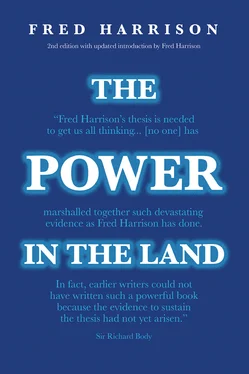But instead of grasping the historic opportunity presented to him of influencing events for the good of all, Smith reinforced the structural defects and human prejudices which were consequently unleashed in all their fury as never before in the history of mankind, given a new dimension by the scale of operations which is a distinguishing characteristic of the industrial mode of production. Whereas in a ‘natural' system based on agriculture, suffering arising from exploitation was limited to individual cases or small groups, now it was transformed into the disgusting deprivations of millions, the malevolent disease stretching itself right round the globe in a system which failed to correspond with Smith's vision of natural harmony.
Smith would have abhored the living portrayal of his system. Unlike his predecessors in the first half of the 18th century, 11 he advocated high wages as a stimulus to hard work. He was anxious about what sociologists today call ‘alienation’, the dulling effect on the spirits of people who specialised in monotonous conveyor-belt activities in the factory. He was a humane man who recognised that, in addition to self-interest, the virtue of ‘sympathy' was a necessary part of the development of individual personality and of civilized society. 12
The competition of Smith's ‘free' market was complemented by the cooperation entailed by the division of labour. Such defects as may arise in the market he sought to attribute to personal motives (as when businessmen conspire to fix prices) rather than to institutional inadequacies. The model that he delineated was not amoral; on the contrary, he saw it as founded on natural justice.
For Smith, natural justice established itself of its own accord for every man, so long as the laws of justice were not violated. Competition was virtuous, and not the naked thing of Marx's nightmares, the operation of some mythical ‘law of the jungle’ in which the weak are destroyed by the strong. One of Smith's rules was the concept of fair play. He illustrated what he understood by this rule, as it applied to each and every person.
In the race for wealth, and honours, and preferments, he may run as hard as he can, and strain every nerve and muscle, in order to outstrip all his competitors. But if he should justle, or throw down any of them, the indulgence of the spectators is entirely at an end. It is a violation of fair play, which they cannot admit of. 13
The equal opportunity for everyone to strive as hard as he or she could, and be rewarded accordingly, in a growing economy which ensured the employment of all, was an intrinsic part of his vision of the good life. So long as all the participants played the game fairly, according to the rules, all would be well. But what if the rules handicapped some of the players in such a way that there was no fair way in which they could either win the race or even reach the finishing line ? What if the rules prevented some of the would-be participants from even joining the game ? These were critical questions to which Smith should have addressed himself, for the structure of property rights, and in particular the monopoly of land, biased the system against some of the players.
Smith may, as some have stated, ‘laid about the landlords in his rhetoric’, 14 but in fact he proposed nothing to deal with them. On the contrary, he sought to excuse the disparity of wealth and income, and was insensitive to the way in which these would interfere with the dynamics of a competitive system.
Adam Smith recognised that rent was exacted by the use of monopoly power, 15 and he did not try to hide his appreciation of that fact. Landlords, he agreed, ‘are the only one of the three orders whose revenue costs them neither labour nor care, but comes to them, as it were, of its own accord, and independent of any plan or project of their own’. 16 But he sought to excuse them by invoking a general psychological disposition.
As soon as the land of any country has all become private property, the landlords like all other men , love to reap where they never sowed, and demand a rent even for its natural produce. 17
Like all other men? To which group in the economy was he referring? He advanced evidence that capitalists and labourers earned their incomes, but was not able to offer any justification for the reapings of the land monopolists; nor could he. So he sought to justify the role of the landlords by claiming that their exactions were the normal psychological failings of all men. He was unwilling to admit that the unwarranted division of income — the result of the exercise of that monopoly power for which he condemned the mercantilists — would disrupt competition.
To maintain his position, he invoked metaphysics; a ‘principle of preservation’ would correct any malfunctioning in the system, as a result of which even poor, landless people would find jobs as country labourers or urban craftsmen. Unfortunately, that was precisely what the crippled hand could not accomplish for all men, at all times. When landless peasants resorted to the town for work, they joined a labour market which was conveniently placed at the disposal of the entrepreneurs who were then able to exploit the vulnerability of wage-seekers. 18
Were the tools available to enable Smith to propose the means by which the frictions in the market system could be eliminated, so that the system could operate closer to its theoretical ideal ? Before defining an answer, we need to look at the dynamics of the land market.
Land as a factor of production has certain unique qualities. For practical purposes, its supply is fixed, at the local level. Ultimately, the world is a closed economy. To control land, therefore, is to wield total power. But there is a more fundamental characteristic which differentiates land from capital and labour: the life span of people and machines is finite; the life of a plot of land is infinite. This has an important consequence for an economy relying simultaneously on competition and co-operation. Land monopolists can — and do — refuse to play the game whenever they choose. If they are not satisfied with the price that they are offered for their land, they can withdraw it from use without fear. They know that the value of the land is constantly appreciating, and that the rental revenue they forego today will be recouped in a few years through an increase in the value of the land (which is the capitalisation of a given number of years’ revenue). People, on the other hand, cannot play the game for any length of time. If they withdraw their labour they starve; and there is no way in which their lost wages can be recovered. Similarly with capital. If the owners withdraw machines, these rot away; the rate of depreciation can be slowed down, but only at the expense of maintaining them while they are idle.
When it comes to a confrontation in the market, then, landowners win. They have time on their side. 19 The system, consequently, malfunctions; and the usefulness of concepts like supply and demand, equilibrium analysis, optimum allocation of resources, efficient distribution of income — the analytical tools of the economist — are seriously restricted.
There is only one free market solution to the partial paralysis which is otherwise present in the industrial system: a fiscal obligation on the possession of land. A tax levied on the market value of all land would constitute a continuous pressure on the possessors, a cost analagous to that on the capitalist who must maintain his machines while they are idle. If the tax was levied at a high enough rate, the effect would be immediate. Either people would use the land to best effect, or, since they could not carry the tax liability for long while the land was not yielding an income, they would have to relinquish it to others. The tax on land values, then, would induce those who possessed land to play the game of competition and co-operation. They could not withdraw from participation and expect to take the land with them. Within this fiscal framework the ‘invisible hand’ would be restored to health and would be capable of handling, in an orderly way, the multiplicity of problems with which it is presented by a community of people with scarce resources, limitless wants and a diversity of tastes.
Читать дальше












